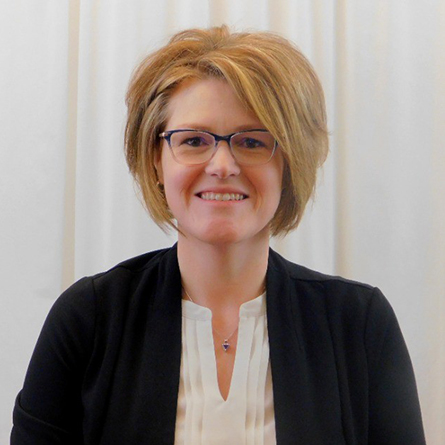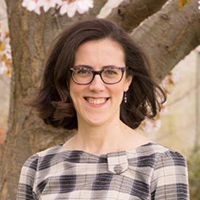
Accessible as ever: The ARC is online and in business
The Academic Resource Center (ARC) is usually a bustling hive of activity. Versatile and nimble, it represents something different for each student. For some, it serves as a port in the storm during finals or when project deadlines draw near, or on the eve of an important internship interview. For others, it’s part of their daily routine—a place where they can get extra help, peer tutoring or time management tips. The center’s impact cannot be overstated; during their four years at the College, every student interacts with the ARC in some capacity.
So, in March, when Conn temporarily transitioned to remote teaching and learning in response to the COVID-19 outbreak, the ARC staff wasted no time adapting in order to fulfill their roles in a new environment, to the great relief of students.
“We moved remote very quickly and immediately adopted the great technology we have for online tutoring and one-on-one meetings between students and learning specialists,” said Noel Garrett, dean of academic support and director of the ARC.
“This has obviously been an adjustment for all of us, but we’ve been able to provide the same level of service as we did before, our team is still very connected, and, most importantly, we are loving that we can still work closely with all of the students, even though we miss seeing them in person,” he added.
The ARC’s tutoring services are now offered through Google Hangouts, and online help request forms that are easily accessible are checked by ARC staff frequently throughout the day so they can meet the needs of students as they arise. The staff has even continued their tradition of a weekly lunch together (now by video conferencing) where they catch up, discuss the week’s work and brainstorm about new and creative ways to serve the students.
Prior to the College going remote, Caleb Gallagher ’23 had grown accustomed to visiting the ARC on almost a daily basis to receive support from Garrett and other members of the center’s staff. And while he admits there were some challenges during the initial adjustment period, he’s been grateful to find that the ARC has still provided what he needs.
“Noel and the ARC are still just as accessible as they were before that transition,” Gallagher said. “Meeting with Noel one-on-one in person has always been super helpful for me, but now we do it via hangout or through Zoom, and I still get the same great help as before.”
While the ARC provides concrete training and support in subjects ranging from math to writing to public speaking and interview coaching, Garett and his staff also establish working relationships with students in ways that build confidence and encourage them to slip outside their comfort zones. Continuing that element of the center’s impact was key to seamlessly transitioning to remote learning.
“I appreciate how Noel and the ARC staff are still providing me with motivation and very supportive comments and feedback on my work,” said Princess Omane ’23. “I’m so grateful that the ARC made it a point to be remote but still provide students with the necessary academic resources to lighten the stress load.”
As part of Connections, the College’s reinvention of the liberal arts, the ARC has collaborated with other departments on campus to create innovative programming like the Career Informed Learning (CIL) initiative.
A project-based program coordinated by the ARC, the Hale Center for Career Development and the Office of Alumni Engagement, CIL brings the expertise and knowledge of Conn’s vast global network of alumni and parents into the classroom to pose real-world challenges for students to overcome.
A new CIL class offered for the first time this semester explored the world of dance writing, and while no in-person performances could be attended, students were able to study different genres of dance and learn to translate the physicality of what they’d seen into their writing.
“This class has emphasized to me the interconnectivity between movement and words and allowed me to improve my ability to articulate that connection,” said Deanna Zois ’20, a dance major and psychology minor. “Going online for this class really hasn’t altered its structure in terms of the work—we continue to do our normal readings outside of class and meet to discuss them through Zoom. It’s been a great experience, and this type of writing is not like the typical academic writing that most of us are used to, but requires you to think differently and rely on what you see to inform how you write- a challenging but fun process to engage with,” she added.
The class was led by Heidi Henderson, chair of the dance department, and Helen Rolfe ’16, a freelance journalist who specializes in covering dance and who has practiced, taught and written about a variety of dance forms.
“Working with this cohort of dance writing students was among the most gratifying and energizing professional experiences I've had thus far,” Rolfe said. “I was amazed by the freshness of the students’ story ideas and by their openness to feedback, and even though the course was entirely online, I felt very connected to the students and I loved our video discussions. My hope is that the members of this course found it as rewarding as I did.”

